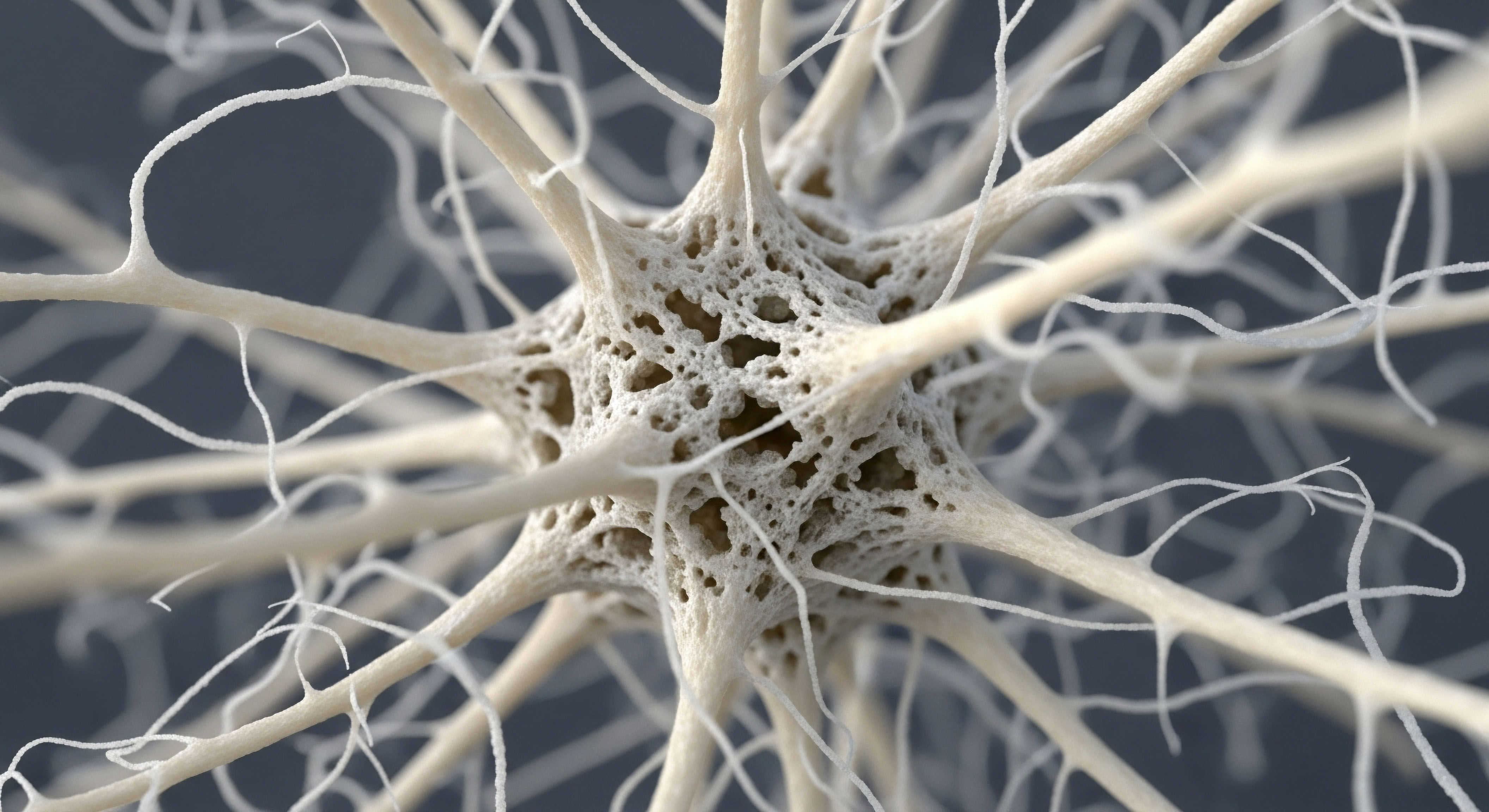

Fundamentals
Have you ever experienced moments where your thoughts feel like they are moving through a dense fog, where familiar names or facts seem just beyond your grasp, or where the sheer effort of concentrating feels overwhelming? This sensation, often described as mental haziness or a lack of cognitive sharpness, can be deeply unsettling.
It can disrupt daily routines, affect professional performance, and diminish the joy found in engaging with the world. Many individuals attribute these changes to stress, aging, or simply a busy life, yet the underlying biological mechanisms often remain unexamined. Understanding the intricate interplay of your body’s internal messaging systems offers a pathway to reclaiming mental clarity and overall vitality.
Our biological systems are remarkably interconnected, operating as a sophisticated network where each component influences the others. Hormones, often perceived primarily for their roles in reproduction or metabolism, act as vital chemical messengers that orchestrate a vast array of bodily functions, including those within the brain.
When these messengers are out of balance, even subtly, the effects can ripple across multiple systems, manifesting as symptoms that might seem unrelated to their origin. A common yet frequently overlooked contributor to these cognitive shifts is a decline in testosterone levels.
Testosterone, while widely recognized for its influence on male characteristics and libido, holds a far broader significance in human physiology, affecting both men and women. This steroid hormone plays a critical role in maintaining bone density, muscle mass, red blood cell production, and mood regulation.
Critically, it also exerts a direct and profound influence on brain function. The brain contains numerous receptors for testosterone, particularly in regions vital for memory, spatial cognition, and executive functions. When testosterone levels fall below optimal ranges, these brain regions may not receive the necessary signals, leading to noticeable changes in cognitive performance.
Cognitive symptoms associated with diminished testosterone levels often manifest as a pervasive mental haziness, affecting concentration and memory recall.

Understanding Hormonal Balance
The body maintains a delicate equilibrium of hormones through complex feedback loops. The hypothalamic-pituitary-gonadal axis (HPG axis) represents a central regulatory pathway for testosterone production. The hypothalamus releases gonadotropin-releasing hormone (GnRH), which signals the pituitary gland to secrete luteinizing hormone (LH) and follicle-stimulating hormone (FSH).
These gonadotropins then stimulate the testes in men and ovaries in women to produce testosterone. Disruptions at any point along this axis can lead to suboptimal testosterone levels, impacting various physiological processes, including cognitive vitality.
For many, the experience of cognitive decline linked to hormonal shifts feels isolating. It is important to recognize that these symptoms are not merely a sign of aging but often a biological signal indicating a need for systemic recalibration. Addressing these underlying hormonal imbalances can lead to a restoration of mental sharpness, emotional stability, and a renewed sense of well-being. This journey begins with acknowledging the symptoms and seeking a deeper understanding of their biological roots.


Intermediate
The cognitive symptoms associated with suboptimal testosterone levels extend beyond a general feeling of mental slowness. Individuals often report specific challenges that affect their daily functioning and overall quality of life. These manifestations can be subtle at first, gradually intensifying over time, making it difficult to pinpoint their origin. Recognizing these distinct patterns represents a crucial step toward addressing the underlying hormonal imbalance.

Specific Cognitive Manifestations
One frequently reported symptom is a persistent brain fog. This describes a state of mental haziness, where thoughts feel less clear and processing information takes more effort. It can manifest as difficulty following conversations, a reduced ability to multitask, or a general sense of mental fatigue even without physical exertion. This cognitive sluggishness can be particularly frustrating in demanding professional or personal environments.
Another significant area affected is memory recall. Individuals may notice trouble remembering recent events, names, or even common words. Learning new information can become more challenging, and the ability to retain it diminishes. This is distinct from age-related forgetfulness, often presenting as a more pervasive and impactful impairment in daily life. The hippocampus, a brain region critical for memory formation and retrieval, contains a high concentration of androgen receptors, making it particularly susceptible to testosterone fluctuations.
Challenges with executive function also commonly arise. This refers to the set of mental skills that include planning, problem-solving, decision-making, and self-regulation. Individuals with low testosterone might find themselves struggling with organization, initiating tasks, or making sound judgments. Their ability to think abstractly or adapt to new situations may also decline, affecting their overall cognitive flexibility.
Testosterone influences brain function by modulating neurotransmitter activity and supporting neuronal health in regions vital for memory and executive skills.
Beyond these direct cognitive effects, low testosterone can also influence mood and emotional regulation, which indirectly impacts cognitive performance. Increased irritability, anxiety, and a diminished sense of motivation are frequently observed. These emotional shifts can further exacerbate cognitive difficulties, creating a cycle where mental and emotional well-being are both compromised.

Clinical Protocols for Hormonal Optimization
Addressing these cognitive symptoms often involves targeted hormonal optimization protocols designed to restore physiological balance. These interventions are tailored to individual needs, considering factors such as age, gender, symptom severity, and overall health status. The goal is to bring testosterone levels into an optimal range, supporting brain function and overall vitality.

Testosterone Replacement Therapy for Men
For men experiencing symptoms of low testosterone, a common and effective approach involves Testosterone Replacement Therapy (TRT). This protocol aims to replenish testosterone levels, alleviating associated cognitive and physical symptoms. A standard approach often includes weekly intramuscular injections of Testosterone Cypionate, typically at a concentration of 200mg/ml. This method provides a steady release of the hormone, helping to maintain stable levels throughout the week.
To support the body’s natural endocrine function and preserve fertility, TRT protocols for men frequently incorporate additional agents. Gonadorelin, administered via subcutaneous injections twice weekly, stimulates the pituitary gland to release LH and FSH, thereby encouraging endogenous testosterone production and maintaining testicular function.
Managing potential side effects, such as the conversion of testosterone to estrogen, is also a key consideration. Anastrozole, an oral tablet taken twice weekly, acts as an aromatase inhibitor, blocking this conversion and helping to mitigate estrogen-related adverse effects. In some cases, Enclomiphene may be included to specifically support LH and FSH levels, further aiding in the maintenance of natural testosterone synthesis.

Testosterone Replacement Therapy for Women
Women also experience the benefits of testosterone optimization, particularly as they navigate pre-menopausal, peri-menopausal, and post-menopausal phases. Symptoms such as irregular cycles, mood changes, hot flashes, and reduced libido can often be linked to declining testosterone levels. Protocols for women are carefully calibrated to their unique physiological needs.
A typical approach involves weekly subcutaneous injections of Testosterone Cypionate, administered in much smaller doses, usually 10 ∞ 20 units (0.1 ∞ 0.2ml). This precise dosing helps to achieve therapeutic levels without inducing unwanted androgenic effects. Progesterone is often prescribed alongside testosterone, with its inclusion and dosage determined by the woman’s menopausal status and specific hormonal profile.
For those seeking a less frequent administration method, pellet therapy offers a long-acting option, where testosterone pellets are inserted subcutaneously, providing a sustained release over several months. Anastrozole may also be utilized in women when appropriate, particularly to manage estrogen levels if concerns arise.
These protocols represent a strategic approach to recalibrating the endocrine system, aiming to restore not only physical vitality but also the mental sharpness that can be diminished by hormonal imbalances. The precise combination and dosage of these agents are always determined through careful clinical assessment and ongoing monitoring.
Here is a comparison of common testosterone optimization protocols:
| Protocol Aspect | Testosterone Replacement Therapy Men | Testosterone Replacement Therapy Women |
|---|---|---|
| Primary Hormone | Testosterone Cypionate | Testosterone Cypionate |
| Typical Administration | Weekly intramuscular injection | Weekly subcutaneous injection |
| Approximate Dosage | 200mg/ml (variable based on individual) | 10 ∞ 20 units (0.1 ∞ 0.2ml) |
| Ancillary Medications | Gonadorelin, Anastrozole, Enclomiphene (optional) | Progesterone, Anastrozole (when appropriate), Pellet Therapy (alternative) |
| Primary Goals | Restore vitality, muscle mass, libido, cognitive function, preserve fertility | Balance hormones, alleviate menopausal symptoms, improve mood, libido, cognitive function |

Post-TRT or Fertility-Stimulating Protocol for Men
For men who have discontinued TRT or are actively trying to conceive, a specialized protocol is often implemented to stimulate natural testosterone production and support fertility. This approach aims to reactivate the HPG axis, which may have been suppressed during exogenous testosterone administration.
The protocol typically includes Gonadorelin, which helps to restart the pituitary’s signaling to the testes. Additionally, selective estrogen receptor modulators (SERMs) like Tamoxifen and Clomid are often prescribed. These agents work by blocking estrogen’s negative feedback on the hypothalamus and pituitary, thereby increasing the release of LH and FSH, which in turn stimulates testicular testosterone production and spermatogenesis. Anastrozole may also be included optionally to manage estrogen levels during this period of hormonal recalibration.


Academic
The influence of testosterone on cognitive function extends to the molecular and cellular levels, involving complex interactions within the central nervous system. A deep understanding of these mechanisms reveals why suboptimal testosterone levels can lead to specific cognitive deficits, moving beyond simple correlations to explain the underlying biological pathways. The brain is not merely a passive recipient of hormonal signals; it actively processes and responds to them, with profound implications for mental acuity.

Neurobiological Mechanisms of Testosterone Action
Testosterone, as an androgen, exerts its effects primarily through binding to androgen receptors (ARs), which are widely distributed throughout the brain. High concentrations of ARs are found in critical cognitive regions, including the hippocampus, responsible for memory formation and spatial navigation, and the prefrontal cortex, which governs executive functions such as planning, decision-making, and working memory.
When testosterone binds to these receptors, it initiates a cascade of intracellular events that influence gene expression, protein synthesis, and neuronal activity. This direct action supports neuronal survival, synaptic plasticity, and the formation of new neural connections, all vital for robust cognitive performance.
Beyond direct receptor binding, testosterone also influences brain function through its conversion to other neuroactive steroids. Within the brain, the enzyme aromatase converts testosterone into estradiol, a potent estrogen. Estrogen receptors are also abundant in cognitive areas, and estradiol plays a significant role in neuroprotection, synaptic plasticity, and memory consolidation.
This dual action, where testosterone itself and its estrogenic metabolites contribute to brain health, underscores the complexity of androgen signaling in the central nervous system. An imbalance in this conversion, or insufficient substrate testosterone, can therefore compromise both androgenic and estrogenic neuroprotective pathways.
Testosterone’s impact on cognition involves direct androgen receptor activation and its conversion to neuroprotective estrogens within brain regions governing memory and executive function.
Testosterone also modulates neurotransmitter systems that are fundamental to cognitive processes. It influences the synthesis and activity of dopamine, a neurotransmitter crucial for motivation, reward, and executive control. Low testosterone can lead to reduced dopaminergic tone, contributing to symptoms like apathy, reduced drive, and impaired focus.
Similarly, testosterone affects serotonin pathways, which are involved in mood regulation and anxiety, and acetylcholine, essential for learning and memory. Disruptions in these intricate neurotransmitter balances can directly translate into the cognitive and emotional symptoms experienced by individuals with low testosterone.

Interplay with Metabolic and Endocrine Systems
The endocrine system operates as a cohesive unit, and testosterone levels are not isolated from other hormonal and metabolic states. For instance, the relationship between testosterone and insulin sensitivity is well-documented. Low testosterone is often associated with insulin resistance, a condition where cells become less responsive to insulin, leading to elevated blood glucose levels.
Insulin resistance can negatively impact brain function by impairing glucose utilization in neurons, promoting neuroinflammation, and increasing oxidative stress, all of which contribute to cognitive decline.
Furthermore, the hypothalamic-pituitary-adrenal (HPA) axis, which regulates the body’s stress response, is intricately linked with the HPG axis. Chronic stress and elevated cortisol levels can suppress testosterone production, creating a vicious cycle where stress exacerbates hormonal imbalance, which in turn can worsen cognitive function and mood. Understanding these systemic interconnections is vital for a comprehensive approach to hormonal optimization and cognitive restoration.

Growth Hormone Peptide Therapy and Cognition
Beyond direct testosterone optimization, certain peptides can offer synergistic benefits for cognitive function, particularly by influencing growth hormone pathways and other restorative processes. These agents are increasingly utilized in personalized wellness protocols to support anti-aging, muscle gain, fat loss, and sleep improvement, all of which indirectly or directly contribute to cognitive vitality.
Sermorelin and Ipamorelin / CJC-1295 are growth hormone-releasing peptides (GHRPs) that stimulate the pituitary gland to produce and secrete growth hormone (GH) naturally. GH plays a role in brain health, supporting neuronal repair, improving sleep quality (which is critical for memory consolidation), and potentially reducing neuroinflammation. Improved sleep alone can significantly alleviate brain fog and enhance mental clarity.
Tesamorelin, a synthetic analogue of growth hormone-releasing hormone (GHRH), has been studied for its effects on cognitive function, particularly in populations with HIV-associated neurocognitive disorder. Its ability to reduce visceral fat and improve metabolic markers can indirectly benefit brain health by reducing systemic inflammation and improving insulin sensitivity.
Hexarelin, another GHRP, also promotes GH release and has shown neuroprotective properties in preclinical studies. MK-677, an oral growth hormone secretagogue, increases GH and IGF-1 levels, potentially supporting brain energy metabolism and neuronal health.

Other Targeted Peptides for Systemic Support
While not directly targeting cognitive function, other peptides contribute to overall well-being, which in turn supports mental acuity. PT-141 (Bremelanotide), primarily used for sexual health, can improve libido and sexual function. A healthy sexual life contributes to overall psychological well-being, reducing stress and improving mood, which can indirectly enhance cognitive performance and reduce mental burden.
Pentadeca Arginate (PDA) is recognized for its roles in tissue repair, healing, and inflammation modulation. Chronic low-grade inflammation, including neuroinflammation, is increasingly recognized as a contributor to cognitive decline. By mitigating systemic inflammation, PDA could indirectly support a healthier brain environment, potentially reducing the cognitive burden associated with inflammatory processes.
Here is a summary of key peptides and their potential cognitive benefits:
| Peptide | Primary Mechanism | Potential Cognitive Benefit |
|---|---|---|
| Sermorelin | Stimulates natural GH release | Improved sleep quality, neuronal repair, reduced neuroinflammation |
| Ipamorelin / CJC-1295 | Enhances GH secretion | Better sleep, neuroprotection, support for brain energy metabolism |
| Tesamorelin | GHRH analogue, reduces visceral fat | Improved metabolic health, reduced systemic inflammation, indirect cognitive support |
| Hexarelin | GHRP, neuroprotective properties | Potential for neuronal health support, anti-inflammatory effects |
| MK-677 | Oral GH secretagogue | Increased GH/IGF-1, support for brain energy and neuronal function |
| PT-141 | Melanocortin receptor agonist (sexual health) | Improved mood and reduced stress from enhanced sexual well-being, indirect cognitive support |
| Pentadeca Arginate (PDA) | Tissue repair, inflammation modulation | Reduced systemic and neuroinflammation, creating a healthier brain environment |

How Does Testosterone Influence Brain Energy Metabolism?
Testosterone’s influence on brain energy metabolism is a critical aspect of its cognitive effects. Neurons are highly energy-dependent cells, relying heavily on mitochondrial function for ATP production. Testosterone has been shown to support mitochondrial biogenesis and function, ensuring that brain cells have an adequate energy supply to perform their complex tasks.
When testosterone levels are low, mitochondrial dysfunction can occur, leading to reduced energy availability for neuronal processes. This energy deficit can manifest as mental fatigue, slower processing speed, and impaired cognitive endurance.
Furthermore, testosterone plays a role in maintaining cerebral blood flow. Adequate blood supply ensures that neurons receive sufficient oxygen and nutrients while waste products are efficiently removed. Testosterone can influence vascular health by promoting nitric oxide production, which helps to relax blood vessels and improve circulation.
Compromised cerebral blood flow due to low testosterone can lead to localized hypoxia and nutrient deprivation, further contributing to cognitive impairment. The intricate dance between hormonal signaling, energy production, and vascular health underscores the systemic nature of cognitive vitality.

References
- Roselli, Charles E. and Jessica B. Estill. “Androgen Receptors in the Brain ∞ An Overview.” In Brain, Behavior and Hormones, edited by David Pfaff, Arthur P. Arnold, Anne M. Etgen, Susan E. Fahrbach, and Robert T. Rubin, 237-256. Academic Press, 2017.
- Bhasin, Shalender, and Ronald S. Swerdloff. “Testosterone Deficiency in Men.” New England Journal of Medicine 383, no. 13 (2020) ∞ 1242-1253.
- Hogervorst, Eef, Stephen M. Lehmann, and David J. E. Schalken. “The Role of Sex Hormones in Cognitive Function.” In Handbook of Clinical Neurology, edited by D. E. Schalken, 105-119. Elsevier, 2012.
- Kalinchenko, Svetlana Y. et al. “Insulin Resistance and Hypogonadism in Men ∞ A Review of the Interplay.” Aging Male 21, no. 1 (2018) ∞ 1-10.
- Veldhuis, Johannes D. et al. “Physiological Regulation of Growth Hormone Secretion in Humans.” Endocrine Reviews 21, no. 1 (2000) ∞ 1-23.
- Vina, Jose, et al. “Testosterone and Brain Metabolism ∞ A Review.” Journal of Steroid Biochemistry and Molecular Biology 183 (2018) ∞ 1-8.

Reflection
Understanding the intricate connections between your hormonal landscape and your cognitive vitality represents a powerful step toward reclaiming your well-being. The journey into hormonal health is deeply personal, reflecting the unique biological symphony playing within each individual. Recognizing that symptoms like mental fog or memory lapses are not simply inevitable aspects of aging, but rather signals from a system seeking balance, shifts the perspective from passive acceptance to proactive engagement.
This exploration of testosterone’s role in brain function is merely a starting point. The insights gained here serve as a foundation, encouraging a deeper introspection into your own body’s signals. True vitality is not found in a single solution, but in a personalized approach that honors your individual physiology.
This understanding empowers you to engage in meaningful conversations with healthcare professionals, advocating for a path that truly aligns with your specific needs and aspirations for a life lived with clarity and full function.



